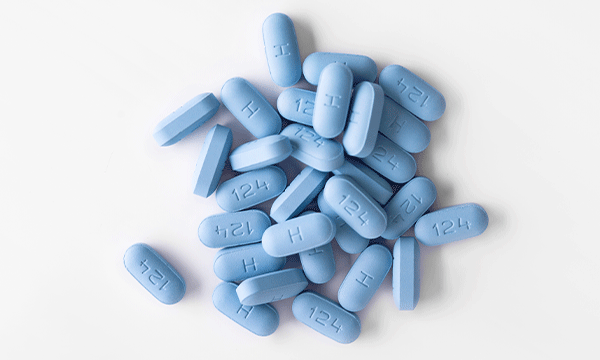You’ve likely heard about both PrEP and PEP for HIV prevention. These treatments are proven effective in preventing HIV transmission, but with one very important distinction: one is for pre-exposure, while the other is for post-exposure to HIV.
In turn, while both have similar objectives, the differences in PrEP vs. PEP for HIV prevention depend on the individual and whether or not they’ve already been exposed. Below we share more information about both options, what you need to know about each treatment, and how you can access them through your health provider.
What is PrEP?
The acronym PrEP might help you remember the main difference between PrEP and PEP, which is that PrEP is a medication designed to prevent an individual from getting HIV before they’ve even been exposed to the virus.
PrEP stands for preexposure prophylaxis. This medication is designed to help prevent individuals from getting HIV if they take it before being exposed.
PrEP Medications
We use two different medicines for PrEP: Truvada and Descovy.
Both of these medications require patients to take one tablet, once a day and have been shown to be up to 98% effective at preventing HIV when taken daily, as prescribed.
It is important to note that Descovy is not approved for use among cisgendered women.
PrEP Side Effects
Common side effects from taking the PrEP medication Truvada include a slight increase in bowel movements, an upset stomach, headaches, and dry mouth.
However, those side effects usually subside within two to four weeks. If side effects continue any longer, we will have a conversation with a patient and decide if we want to try Descovy.
Though the side effects are similar with both medications, some patients notice negative side effects when they take one but not the other. So we will work with patients to find out which works best for them.
How well does PrEP work?
Both Truvada and Descovy offer a high rate of effectiveness. If patients take Truvada daily, as prescribed, they should experience a 98% to 99% of effectiveness in preventing HIV transmission. Keep in mind, the rate of effectiveness drops to about 74% when you’re sharing IV needles.
Patients should also use a backup form of contraceptives and protection for at least the first seven days using PrEP if engaging in anal sex and about 21 days if engaging in vaginal sex.
Also, PrEP does not prevent other forms of sexually transmitted diseases and infections, so patients should still use some form of barrier protection whenever possible even when taking PrEP.
Finally, patients should know that even with a high rate of efficacy, PrEP does not eliminate all risk. Consider PrEP like wearing a seatbelt, which protects you during an accident, but does not guarantee you will be 100% safe when driving or riding in a car.
Who should take PrEP?
1. Receptive Partners in Penetrative Intercourse
PrEP is recommended for individuals engaging in penetrative sex who receive penetration. HIV is a fragile virus, so it doesn’t live outside the body or in contact with oxygen for long. That means when it comes to sexual activity, anyone who receives, or gets penetrated either anally or vaginally, during intercourse is more likely to contract the virus.
2. Individuals Using Intravenous Drugs and Sharing Needles
Anyone who injects IV drugs or shares needles is also recommended to take PrEP. The bevel or tip of a needle protects the HIV virus in the blood, so if someone has HIV and uses a needle, the tip of the needle maintains a portion of that person’s blood that can be shared to the next person who uses it.
3. Individuals with Multiple Sexual Partners
Those who engage in sex with multiple different partners are also recommended to take PrEP. Essentially, anytime you increase the number of individuals you have sexual intercourse with, you are also increasing your risk of contracting HIV.
Have an honest conversation about PrEP with your provider.
It’s important to have an open and honest conversation with your provider about your sexual activities and whether you use intravenous needles and might be at risk of contracting HIV.
Even if you are worried that you won’t be able to afford PrEP without insurance, you should still talk to your healthcare provider, because there are now programs and options available to help individuals without insurance take PrEP for HIV prevention.
Follow up with your provider every three months.
You should also be making follow-up appointments with your provider every three months. There are a few reasons for this.
- PrEP is still only 98 to 99% effective, so patients still have a 1 to 2% chance of getting HIV while taking PrEP.
- Patients who are engaging in behavior that would require them to take PrEP might also contract other STIs or STDs, in which case a follow-up every three months will help your provider treat that infection and help you discover how and where you might have gotten it.
- Patients need to get bloodwork done to monitor kidney function while taking PrEP. Though kidney function usually goes back to normal when patients stop taking PrEP, the numbers we test for kidney function sometimes show up differently, but this could be due to different factors not related to kidney function. Either way, follow-up appointments help providers make sure you’re healthy and that the PrEP is working for you.
Cost of PrEP
PrEP medications have pretty good commercial coverage, so your insurance should cover the cost. But if it doesn’t cover it, or if your deductible hasn’t been met, we direct patients to the Gilead advancing access program. You can apply by visiting GileadAdvancingAccess.com and filling out a simple application form.
The Gilead copay card helps patients pay for their PrEP treatment. So, make sure your PrEP goes through insurance first, and then whatever copay is leftover should get paid by your Gilead copay card. And, once you meet your deductible, your insurance should cover the entire cost.
What is PEP?
While PrEP helps prevent HIV infection prior to exposure, PEP helps to treat patients who have been exposed to HIV.
PEP stands for post exposure prophylaxis. So, the main difference here is that PEP is for patients who have already been exposed to HIV and need treatment to prevent transmission.
It’s important to note that patients who think they have been exposed to HIV have a 72-hour window from the time of exposure to take PEP for the treatment to be effective.
PEP Medications
PEP is actually a combination of drugs. Truvada, which is used as a form of PrEP, can be a component of PEP as well. We also add another HIV drug, and which one we use depends on the patient, their insurance coverage, and needs.
Usually, at our practice, we prescribe either Truvada and Descovy along with dolutegravir, which is an integrase inhibitor and great for HIV treatment. When these medications are dosed together, patients can reduce their risk of contracting HIV by more than 80%.
You can also take raltegravir, but patients have to take that medication twice a day, whereas they can take the mix of Truvada and dolutegravir only once a day, which is easier to remember. If you think you have been exposed to HIV, you will take these medications for 28 days and then do repeat testing.
PEP Side Effects
PEP side effects are similar to PrEP side effects, as in you might experience gastrointestinal issues, headaches, or changes in your sleep patterns. However, these side effects tend to subside within the first few days of taking the medication and definitely by two weeks.
Since the treatment is only 28 days, mild side effects are usually bearable for patients who are worried about HIV exposure.
How well does PEP work?
PEP can only work when you take it within the 72-hour window of possible exposure to HIV. Then, when patients follow the prescribed dose and take their medications daily for 28 days, they reduce their risk of transmission by 80%.
Follow up with your provider.
If you think you’ve been exposed to HIV, you’ll start taking PEP within that 72-hour window and then take it for 28 days. At your first appointment, you’ll also get tested for syphilis, gonorrhea, hepatitis A, B, and C, as well as HIV. If you’re a cisgendered female, you will take a pregnancy test as well.
After that, you will follow up with your provider to take additional tests for HIV, syphilis, and gonorrhea. If you are a cis female, you’ll likely take another pregnancy test. This follow up appointment is super important, as it will show whether the PEP treatment worked to prevent HIV.
Cost of PEP
The process of getting PEP treatments covered is similar to PrEP. You can still apply for the Gilead Advancing Access Program.
Make sure that when you go to get your PEP treatment, you go to an experienced provider, HIV specialist, or urgent care clinic that understands the urgency of getting this treatment to you. You shouldn’t face barriers to access, as you need to take the treatment within that 72-hour window of exposure.
PrEP and PEP Providers: No Judgment Zone
You deserve to have access to PrEP and PEP to prevent HIV transmission, because you deserve to have an active sex life without any judgment from your medical providers or barriers to health treatments.
That’s why your provider should offer you a judgment-free zone. Contact me if you have any questions about PrEP or PEP for HIV prevention or need help navigating any concern regarding HIV prevention or treatment. I am here to help.


